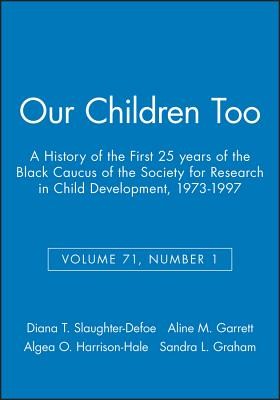
- We will send in 10–14 business days.
- Author: Graham
- Publisher: John Wiley & Sons
- ISBN-10: 1405154853
- ISBN-13: 9781405154857
- Format: 15.4 x 22.9 x 1.2 cm, minkšti viršeliai
- Language: English
- SAVE -10% with code: EXTRA
Reviews
Description
The Black Caucus of the Society for Research in Child Development (SRCD) was founded in 1973 to address concerns about the portrayal of Black children in scientific research, the lack of participation of ethnic minority members in the governance structure of SRCD, and the perceived need for a mutual support system for minority scholars aspiring to productive careers in the child development field. In this monograph, early members of the Caucus describe its history through the first 25 years, 1973-97, in 15 chapters distributed among sections on Caucus history, teaching and mentoring, publications and research-related issues, and supportive academic institutions. The volume celebrates the accomplishments of the Caucus while also revisiting challenges that have arisen both internally and through membership in the SRCD parent organization. Key thematic issues include: cultural deficit versus cultural difference; linkages between poverty, race, and empowerment; advocacy versus objectivity in scientific research; and how the cultural or racial identity of the researcher informs scientific knowledge.
The collaborations of Caucus members and others in SRCD modified the lens through which children of racially and ethnically diverse backgrounds are portrayed in the scientific literature.
EXTRA 10 % discount with code: EXTRA
The promotion ends in 22d.19:27:47
The discount code is valid when purchasing from 10 €. Discounts do not stack.
- Author: Graham
- Publisher: John Wiley & Sons
- ISBN-10: 1405154853
- ISBN-13: 9781405154857
- Format: 15.4 x 22.9 x 1.2 cm, minkšti viršeliai
- Language: English English
The Black Caucus of the Society for Research in Child Development (SRCD) was founded in 1973 to address concerns about the portrayal of Black children in scientific research, the lack of participation of ethnic minority members in the governance structure of SRCD, and the perceived need for a mutual support system for minority scholars aspiring to productive careers in the child development field. In this monograph, early members of the Caucus describe its history through the first 25 years, 1973-97, in 15 chapters distributed among sections on Caucus history, teaching and mentoring, publications and research-related issues, and supportive academic institutions. The volume celebrates the accomplishments of the Caucus while also revisiting challenges that have arisen both internally and through membership in the SRCD parent organization. Key thematic issues include: cultural deficit versus cultural difference; linkages between poverty, race, and empowerment; advocacy versus objectivity in scientific research; and how the cultural or racial identity of the researcher informs scientific knowledge.
The collaborations of Caucus members and others in SRCD modified the lens through which children of racially and ethnically diverse backgrounds are portrayed in the scientific literature.


Reviews